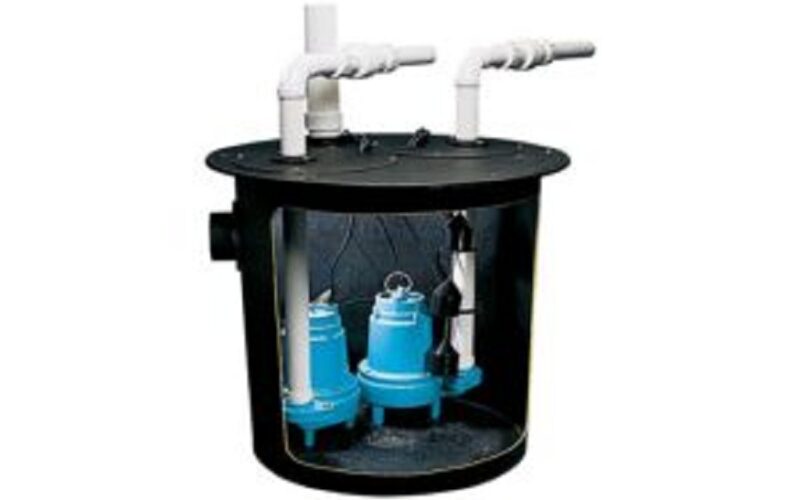Residential as well as business buildings depend on effective wastewater management. A duplex sewer pump station is a necessary part for managing wastewater and sewage. Preventing obstructions, preserving consistent sewage flow, and guaranteeing dependability in wastewater disposal depend on these systems greatly. Duplex pump stations use two pumps, unlike conventional single-pump systems, therefore providing improved efficiency and resistance against failure. The value, use, and advantages of duplex sewer pump station are investigated in this paper.
Duplex Sewer Pump Station Operation
Especially in places where gravity-based drainage solutions are not practical, duplex sewer pump stations are made to transport wastewater from lower to higher altitudes. They include two pumps located in a wet well and a control panel designed to alternate the pump running times. While the second pump serves as a backup or activates during high flow, one pump runs continuously.
Main Parts of a Duplex Sewer Pump Station
The foundation of the system, dual pumps let alternate use maintain redundancy and enhance longevity.
Wet wells are holding chambers where wastewater accumulates before being expelled.
These sensors called float switches sense wastewater levels and turn on pumps in line.
Manages pump operation with automated alternation and maintenance requirements alerting on control panel.
Discharge pipework guides wastewater towards a treatment plant or main sewage system.
Ad advantages of duplex sewer pump stations
- Redundancy for Unbroken Operation
Duplex systems have a major benefit in that one pump can operate even if another fails. Should one pump fail, the second pump takes over automatically, therefore avoiding system breakdowns and sewage backups.
- Higher Longevity and Efficiency
Two pumps alternately help to reduce wear and tear on particular parts. This equal workload reduces maintenance and replacement expenses, therefore extending the lifetime of the system.
- Improved Management of High Wastewater Loads
Both pumps may operate concurrently to manage extra wastewater, therefore avoiding system overload, during periods of maximum use—that is, during heavy rain or higher facility occupancy.
- Less Chance of Flooding and Sewer Backups
A dual-pump system greatly reduces the likelihood of sewage backing up from pump failure, therefore guaranteeing a sanitary surroundings.
- Enhanced Cost-Effectiveness Over Time
Although the initial outlay for a duplex system might be more than that of a single-pump station, over time its dependability, low maintenance requirements, and longer lifetime make it a less expensive option.
- Automatic Alternation for Equivalent Wear
Usually including an automated alternation function that alternates between the pumps after each cycle, most duplex systems This equitable allocation of effort extends the general service life of the system and helps to avoid early breakdown of one pump.
- Perfect for Residential and Business Uses Alike
Versatile duplex pump stations serve both large-scale commercial buildings and modest homes. In situations where continuous wastewater management is absolutely vital, they are very helpful.
- Power Management and Energy Efficiency
Energy economy is considered in design of modern duplex sewage pump stations. Changing between pumps lowers ongoing power use, which lowers energy costs and promotes ecologically friendly operation.
- Improved Smart Control Features and Monitoring
Integrating with monitoring systems, advanced duplex pump stations provide real-time data on system operation, flow rates, and any problems. Early diagnosis of faults and predictive maintenance made possible by this help to lower repair costs and downtime.
- Flexibility in Various Surroundings
Duplex sewage pump stations are flexible in many environmental circumstances whether they are placed in residential areas, industrial zones, or metropolitan infrastructure. Their handling of various wastewater compositions—including those with more solid content—allows for
- Simple Integration with Currently In Use Sewer Systems
Duplex sewage pump stations are designed to be perfectly compatible with the present sewer system. Whether they are integrated into a new project or added to an already-existing system, they may be tailored to match particular needs with no additional work.
- Stopping Problems with Odour and Contamination
Duplex pump stations assist to avoid bad smells and possible contamination by keeping constant wastewater circulation. Public hygiene depends on a well-maintaining duplex system as stagnant wastewater may cause bad odours and health hazards.
- Modern Safety Measures for Reliability Over Extended Period
Built-in safety features include alarm systems, emergency shut-offs, and real-time monitoring abound in many contemporary duplex systems to avoid failures and expensive damage. These characteristics guarantee long-term system dependability and help to save maintenance costs.
- Minimum Downtime During Maintenance
Given two pumps in duplex pump stations, maintenance may be done on one pump while the other keeps running. Commercial and industrial uses depend on continuous wastewater management, so this reduces downtime and guarantees it.
- Ability to Manage Emergencies
Duplex pump stations may turn on both pumps at once in case of unanticipated increases in wastewater flow brought on by pipe breaches, storms, or higher use. This emergency handling capacity stops overflows and protects the nearby area from pollution.
Considerations Prior to Duplex Sewer Pump Station Installation
- Analysing Site Needs
Analysing the particular requirements of the site is very vital before installation. One should take into account geography, wastewater volume, and closeness to sewage lines among other things.
- Selecting Appropriate Pump Capacity
The anticipated wastewater load should match the pumps’ capability. While an overloaded system could cause needless energy consumption, choosing an underpowered system might cause inefficiencies.
- Service and Maintenance Requests
Ensuring the lifetime of the pump station depends on routine maintenance. Establishing a service plan can help property owners examine control panels, clean the wet well and inspect pumps.
- Respect of Local Laws
Various areas have particular rules controlling methods of wastewater treatment. Following these rules guarantees correct functioning and helps to prevent legal problems.
- Financial Factors
Although duplex systems have great benefits, their starting cost may be more than that of single-pump stations. Still, the long-term advantages exceed the initial outlay, so they are a sensible investment.
Conclusion
Modern wastewater management depends much on duplex sewage lift pump with grinder, which provide dependability, efficiency, and long-term financial savings. Their dual-pump design guarantees continuous functioning, hence they are a great option for home and business uses. Purchasing a well-designed duplex system offers peace of mind, enhances environmental cleanliness, and helps stop sewage backups. Understanding their advantages and installation issues can help property owners make wise selections to improve their wastewater handling system.

